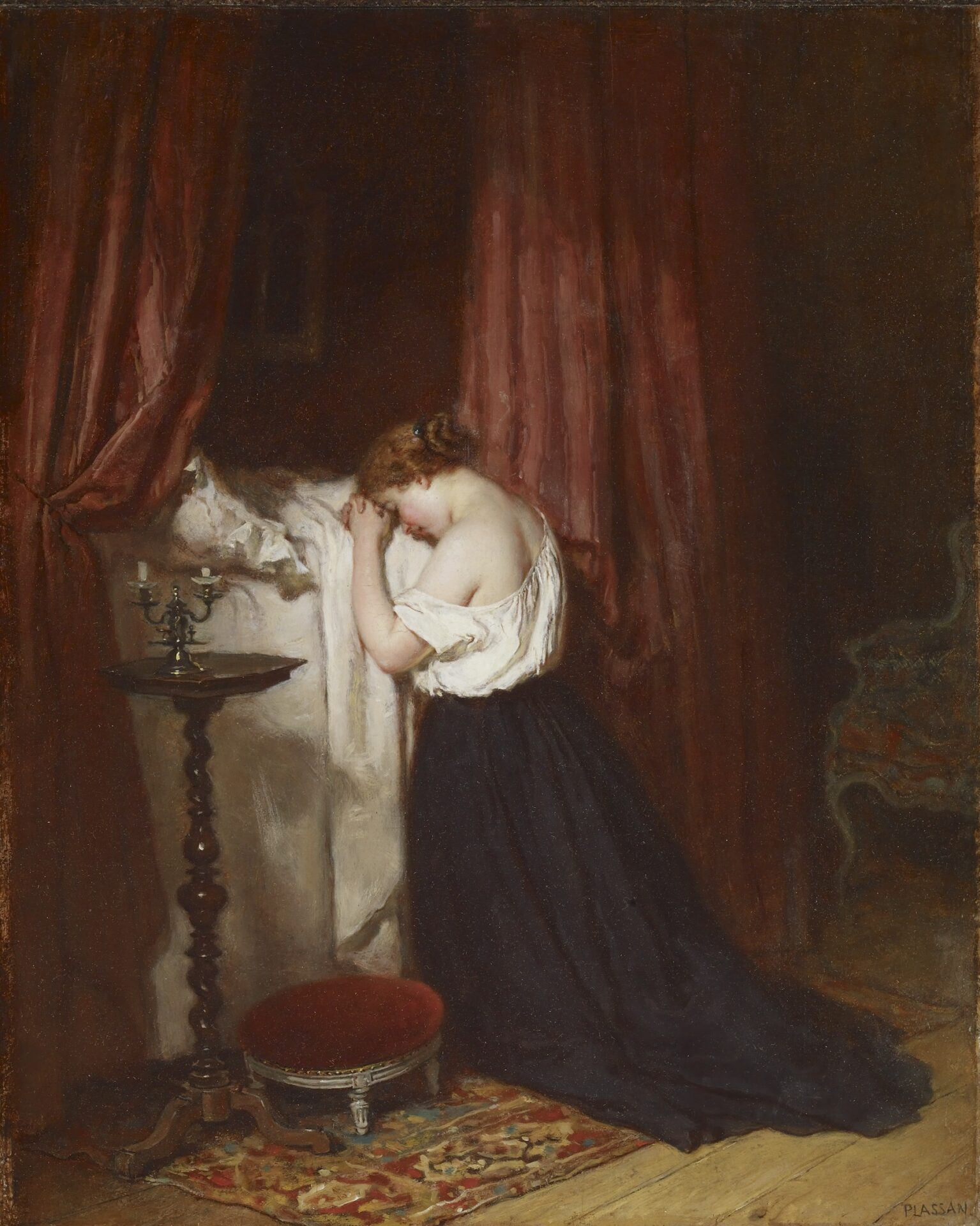“They’re after me. I know it.”
Her voice is furtive, her eyes down. She looks across at me. My eyes lock with her wildly defensive, fearful ones. She searches my face to see if I believe her. Even my compassionate expression sets her on edge. I gently probe for details. “How do you know they are?”
Her eyes narrow distrustfully. In not wholeheartedly accepting her explanation, I have become one more person she must guard herself against. Her mouth sets, her hands clench, her voice hardens as she gives me bullet-proof reasons for her paranoia. And yet, dancing around the edges of her eyes, clawing to be let out of the suffocating prison of her mind, is a deeper reason which cries out “Help me! Help me! I don’t know what to do!” And it is that deeper reason whose gaze I try to hold.
More than one person I care about has had this conversation with me, fighting irrational fear that consumes their lives. The details differ for each person: the local police department is covering up murder, and my friend is next on their hitlist; a doctor is stealing personal information and carrying out covert experiments on my loved one; my friend is the subject of comprehensive military espionage; everyone my friend knows at church spends their free time either gossiping about her or looking for a way to bed her. While the details of their stories differ, the story arc is the same: tight logic driven by fear, and an inability to see circumstances from a different perspective.
In Orthodoxy, Chesterton writes that a person like my friend “is not [one] who has lost his reason…[he] is [one] who has lost everything except his reason.” In the case of those close to me, their razor-sharp, psychotic reasoning has not been softened by, as Chesterton puts it, “humor or by charity, or by the dumb certainties of experience.” One can only laugh at herself or see someone else in a generous light or remember all the times when it wasn’t so bad as expected if she is anchored to a love that holds her steady when internal storms of fear rage. But those who lack such security—who feel they have only themselves to rely on—dare not trust anything but their cold, hard reason. And they do have reason—but only a very narrow reason.
Chesterton writes that their irrational explanation “. . . is quite as complete as the sane one, but it is not so large. A bullet is quite as round as the world, but it is not the world. There is such a thing as a narrow universality; there is such a thing as a small and cramped eternity . . . [Their thinking] is this combination between a logical completeness and a spiritual contraction. [Their] theory explains a large number of things, but it does not explain them in a large way.”
When those I love are gripped by this all-consuming fear, there is no reasoning with them. Their logic is air-tight, and they cannot be convinced otherwise. Often, I am helpless to understand why they feel the way they do or how to help them escape their mental imprisonment.
In Habits of the Household, Justin Whitmel Earley writes about how, from the beginning of our existence, we are primed to seek a love that is seeking us. In his words: “Neurologists say that we are all born looking for someone who is looking for us.” Infants instinctively look for the face of a loving parent. As we grow, we seek this love that seeks us from friends, family, lovers.
Yet for those close to me, this search yielded heartbreak. They were left looking for an elusive, loving face that was looking for them. Instead, those closest to them—those who should have been faithful, reassuring presences in their lives—abandoned them, betrayed them, stopped looking for them. And yet, despite this profound betrayal, my friends never stopped looking for a face that was looking for them. Their need to be noticed, to be seen, to have a life that mattered to someone else, was too strong to deny. But perhaps in a psychosomatic urge toward self-protection, their search for the face that was seeking them became inverted. Instead of looking for benevolent eyes looking for them, in times of stress they become convinced that someone malevolent is lurking in the shadows, seeking to do them harm. They are convinced there is someone searching for them, but that someone is out to harm them, not protect them.
Chesterton writes of how we might respond to those we love “if we could express our deepest feelings of protest and appeal against this obsession . . . :
‘Oh, I admit that you have your case and have it by heart, and that many things do fit into other things as you say. I admit that your explanation explains a great deal; but what a great deal it leaves out! Are there no other stories in the world except yours; and are all men busy with your business? Suppose we grant the details; perhaps when the man in the street did not seem to see you it was only his cunning; perhaps when the policeman asked you your name it was only because he knew it already. But how much happier you would be if you only knew that these people cared nothing about you! How much larger your life would be if your self could become smaller in it; if you could really look at other men with common curiosity and pleasure; if you could see them walking as they are in their sunny selfishness and their virile indifference! You would begin to be interested in them because they were not interested in you. You would break out of this tiny and tawdry theatre in which your own little plot is always being played, and you would find yourself under a freer sky, in a street full of splendid strangers’” (Orthodoxy).
Chesterton’s response, when I first read it, hit me like a deep draught of clear mountain air sweeping through a cramped and fetid hut. How wonderful it would be to tell my friends the truth, to bat them about with the force of Edna Mode as I exhort them to “Pull yourself together!” How nice it would be to stop pretending that their morbid fantasy is anything but that—morbid and fantastical. Yet, to tell my loved ones that they are delusional and there is no one looking for them would be to tell that their most primal fear has been realized: they are truly alone in the world, and no one cares for them. I can’t do that. That would be devastating news, and every self-protective instinct of theirs would fight against it. So, what can I do?
Acknowledging their fear, empathizing with their plight, and making them feel seen are good first steps. But what they really need is hope to anchor their soul to—hope that they are seen AND loved not just by me, but by One who has delighted in them their whole life long. Because while the police or the doctor or their friends may not be seeking to harm them (or even thinking about them at all), there is Someone watching out for them. One who has searched them and known them, One who knows when they sit and when they rise, Who has perceived their thoughts from afar, is near. The One who created their inmost being, Who knit them together in their mother’s womb, Whose eyes saw their unformed body, is looking for them. Wherever they go, His hand guides them and His right hand holds them fast. His thoughts toward them outnumber the grains of sand; when they awake, they are still with Him. He is mighty to save them, He rejoices over them with singing; He quiets them by His love. Though their mother or father, their husband or lover has forsaken them, the Lord takes them up.
But just acknowledging this truth is not enough. My friends must accept it. How do I know? Because, this has been my story, too. Like my friends, I have fallen prey to conspiracy thinking—imagining the worst to protect myself from it. While I may not believe I’m next on a covert hitlist, too often I let perceived slights form my reality. Fear grips me, and my world closes in. “He doesn’t love me anymore.” “She despises me.” “They are deliberately shunning me.” These thoughts and a thousand like them are the brick and mortar with which I build my mental prison.
Brene Brown, in her book Daring Greatly, writes that “conspiracy thinking is all about fear-based self-protection and our intolerance for uncertainty. When we depend on self-protecting narratives often enough, they become our default stories.” And our default stories become our truth. The problem is that these stories often aren’t true. They’re false placeholders for truth that requires vulnerability to find. But to see beyond a narrative to the truth, we must open our white-knuckled hand and surrender the narrow reason we so closely clutch. Only then can we receive greater insight.
King Solomon, the wisest man who ever lived, instructs us on how to do this. He writes: “Trust in the LORD with all your heart, and do not lean on your own understanding. In all your ways acknowledge Him, and He will make straight your paths.”
So, to be sane, we must trust One greater than ourselves with the weight of the world. We exchange our logical completeness and spiritual contraction for spiritual expansion and a logic too big to fit in our pill-bottle sized brains. It would be easy to dismiss my argument as a simple platitude: “Trust God.” But it is trust in the infinite that allows us to trust finite beings. Like a rock climber trusts his rope to hold him, when we trust One who is stable and unchanging, we are freed to move toward others where relationships feel more tenuous. Or, to change the metaphor, when God’s love covers us, we can risk being vulnerable with others because we know that ultimately, we are His. When we acknowledge that our reason is too narrow to fit reality, we rely on One with wisdom infinitely beyond our own, and by doing so, we transcend the walls of our self-made cells.
Dr. Henry Cloud and Dr. John Townsend, in their book Boundaries with Kids, write that “people who have the ability to transcend themselves go beyond their own existence to the reality of others, God, and virtues they hold more important than themselves and their own immediate happiness . . . in short, because they realize that life is bigger than they are, they become bigger than they are at any given moment to meet its demands. Humility makes them larger than they were—the ultimate paradox.”
So we embrace humility, and we find how much larger our lives become as we becomes smaller in them. We break out of the tiny and tawdry theatre in which our own little plots are always being played, and we find ourselves under a freer sky, in a street full of splendid strangers, borne by Reality big enough to hold the whole world, us included, in His hands.
Image Credit: Antoine-Emile Plassan, “Evening Prayer” (1863-1864) via The Walters Art Museum’s Online Collection






2 comments
Jim McCullough
Much appreciated.
Psalm 27:8 and also 2 Chronicles 7:14
Sarah Silflow
Thank you, Jim. Amen to the promises you shared.
Comments are closed.